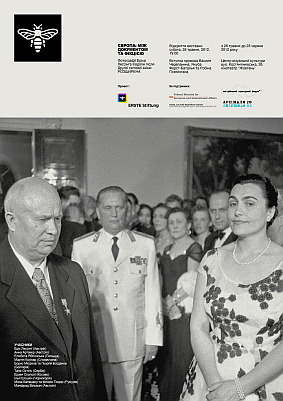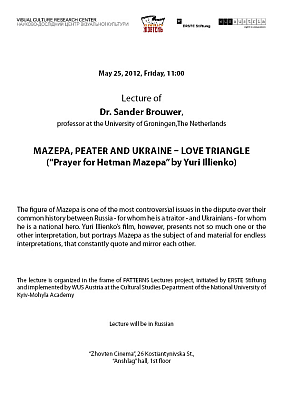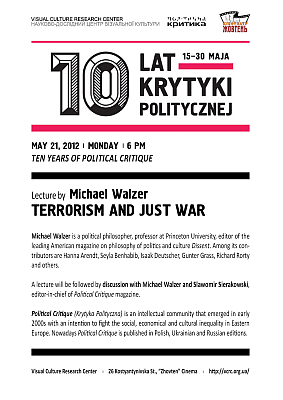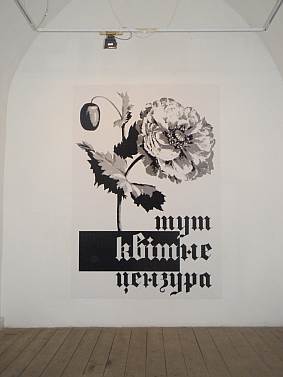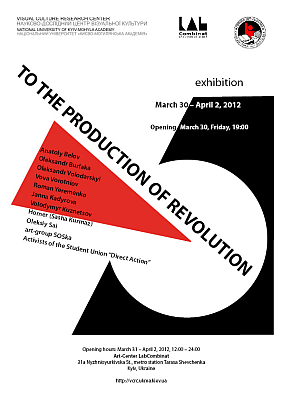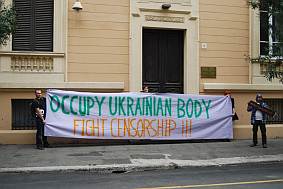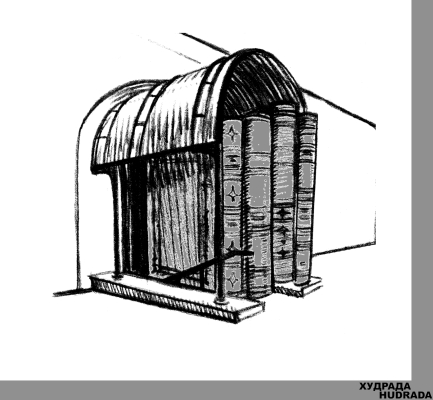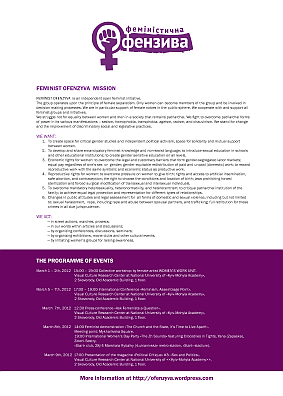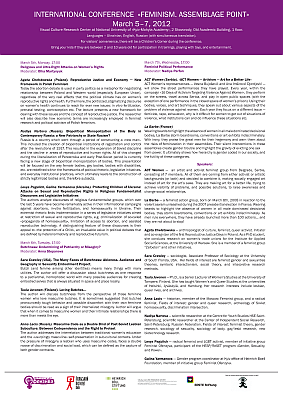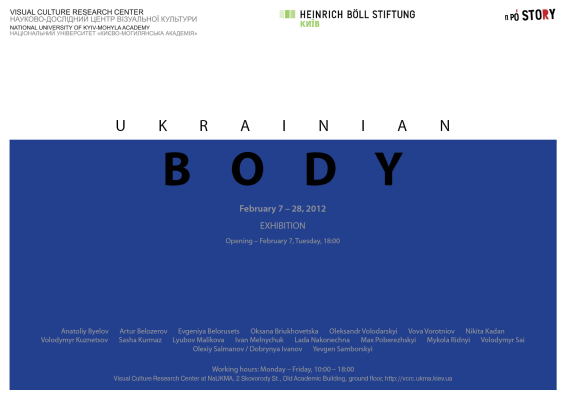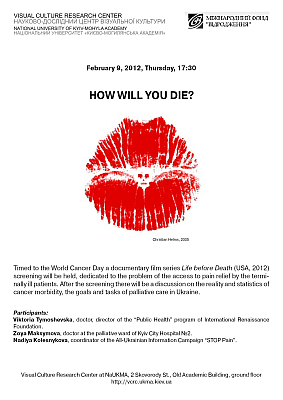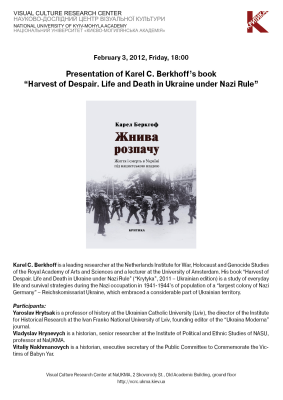EUROPE: IN BETWEEN DOCUMENT AND FICTION
Erich Lessing's photographs from Post-World War II Europe EXPANDED
May 26 - June 23
Opening of the exhibition: Saturday, May 26, 2012, 7 pm
Visual Culture Research Center
26 Kostyantynivska St., “Zhovten” Cinema
The basis for the project is the photography of Erich Lessing, one of Austria’s most renowned photographers and a member of the prestigious photo agency Magnum Photos, who has chronicled the world and interpreted its people, events, issues and personalities. The researches and documents the culture of Central and South Eastern Europe, thereby promoting knowledge and understanding of that region. The curators Marina Gržinić and Walter Seidl were invited to select artists from the respective countries who would react to Lessing’s photographs and create parallel histories, histories which conceptually reflect the social, political and historical changes in the region with and through the medium of photography.
ARTISTS
Erich Lessing (A)
Anna Artaker (A)
Elżbieta Jabłońska (PL)
Šejla Kamerić (BiH)
Martin Kollár (SK)
Boris Missirkov & Georgi Bogdanov (BG)
Tanja Ostojić (SRB)
Erzen Shkololli (KOS)
Ilija Šoškić (MNE)
Mona Vatamanu & Florin Tudor (RO)
Manfred Willmann (A)
Curators: Marina Gržinić and Walter Seidl
A project by Erste Foundation, Vienna, supported by the Austrian Federal Ministry for European and International Affairs and the Austrian Cultural Forum Kyiv
Opening speeches by Vasyl Cherepanyn, Jakub Forst-Battaglia and Robin Gosejohann
Exhibition: May 26, 2012 to June 23, 2012
A comprehensive catalogue of the exhibition will be available with essays by Rozalinda Borcilă, Cristian Nae, Marina Gržinić and Walter Seidl.
Within the exhibition project of the Visual Culture Research Center "Image in the Dark: Contemporary Critical Photography" in the frame of the Parallel Exhibition Program of the First Kyiv Biennale of Contemporary Art “ARSENALE 2012”
Mazepa, Peater and Ukraine – love triangle
(“Prayer for Hetman Mazepa” by Yuri Illienko)
Lecture of Dr. Sander Brouwer,professor at the University of Groningen,The Netherlands
May 25, 2012, Friday, 11:00
The figure of Mazepa is one of the most controversial issues in the dispute over their common history between Russia - for whom he is a traitor - and Ukrainians - for whom he is a national hero. Yuri Illienko’s film, however, presents not so much one or the other interpretation, but portrays Mazepa as the subject of and material for endless interpretations, that constantly quote and mirror each other.
The lecture is organized in the frame of PATTERNS Lectures project, initiated by ERSTE Stiftung and implemented by WUS Austria at the Cultural Studies Department of the National University of Kyiv-Mohyla Academy.
Lecture will be in Russian.
“Zhоvten Cinema”, 26 Kostiantynivska St.,
“Anshlag” hall, 1st floor
TERRORISM AND JUST WAR
Lecture by Michael Walzer
May 21, 2012, Monday, 6 pm
Michael Walzer – is a political philosopher, professor at Princeton University, editor of the leading American magazine on philosophy of politics and culture Dissent, Among its contributors are Hanna Arendt, Seyla Benhabib, Isaak Deutscher, Gunter Grass, Richard Rorty and others.
A lecture will be followed by discussion with Michael Walzer and Slawomir Sierakowski, editor-in-chief of Political Critique magazine.
Political Critique (Krytyka Polityczna) is an intellectual community that emerged in early 2000s with an intention to fight the social, economical and cultural inequality in Eastern Europe. Nowadays Political Critique is published in Polish, Ukrainian and Russian editions.
May Congress in Kyiv
creative workers, leftist and feminist forces against censorship and discrimination
20-22 May 2012, 12:00 - 21:00
On Sunday, May 20th, 2012 at 12:00 at the Visual Culture Research Center (26 Kostyantynivska St., “Zhovten” Cinema) the opening of the first ukrainian May Day Congress of Creative Workers, left-wing and feminist forces will take place. The united May Day Congress aims to combat all manifestations of artistic and political censorship, as well as gender and sexual discrimination.
May Day Congress of Creative Workers is an assembly of artists, theorists, curators, editors, activists and all those involved in activities in the field of alternative culture and humanities. Apart from censorship and political repressions against the Visual Culture Research Center in Kyiv and the Pussy Riot action group in Moscow, we are going to talk about sexual politics and violence in our society. The Congress will be running under the feminist slogan “the personal is political” covering the marginal issues of the mainstream discourse: the patriarchal order of sexual relations, discrimination against women by social and legal norms, the anti-abortion law, the law against “homosexual propaganda”, etc. We encourage creative workers, leftist activists, feminists to unite for the development of alternative cultural, gender, and sexual politics. We need international involvement of all those interested in the local mechanisms of adoption and implementation of such decisions.
The program of May Day Congress will include presentations, discussions, screenings, book fair, demonstrations, poetry readings, concerts with the participation of international community of artists, intellectuals, and activists.
Organizers: The May Day Congress of Creative Workers (Moscow, Russia), Visual Culture Research Center (Kyiv, Ukraine)
Program
May 20, Sunday
Visual Culture Research Center (26, Kostyantynivska St., Zhovten Cinema)
12:00. Curators and Participants Marathon: the Tasks of May Congress.
Nikolay Oleynikov (artist, Chto delat? Group, May Congress, Learning Film Group). May Congress: Fantastic Tasks, Cosmic Fails, Empyrean Hopes.
Arseniy Zhilyaev (artist, curator, Russian Socialist Movement, Creative Workers Union). Creative Workers Union: the Experience of Self-organization. The Production of Art, Knowledge and Politics in the Project “Pedagogical Poem”.
Pavel Arsenyev (poet, Laboratory for Political Actionism, Street University, Student Action), Oleg Zhuravlyov (sociologist, ОD-Group, Student Action). Street University and Its Politics of Resistance.
Isabel Magkoeva (Russian Socialist Movement). New Forms of Protest Movement in Russia. From # ОccupyMoscow to #ОccupyAbay.
Nikolay Ridnyi (artist, SOSka art group). Self-organization and the Construction of Non-hierarchical Communication System. Kharkiv Apartment Exhibitions by way of Example.
Nikita Kadan (artist, REP group). “Hudrada”: School of Interdisciplinary Interaction.
Zakhar Popovych (Left Opposition, “GasloInfo” Internet Edition). Copyright as the Mechanism for Implementing Censorship in the Internet.
Dmitriy Vilensky (artist, Chto delat? Group). The Future of May Congress.
Discussion: Which Cultural Policy do the Left-wing Need: Biennale (Kyiv Arsenale 2012) VS Self-organized Assemblies (May Congress).
15:00. Feminist section
Yelyzaveta Babenko (culturologist, Visual Culture Research Center, Feminist Ofenzyva, Leftist Feminist Initiative). Private is Political. Introduction to Feminist Strategies of Resistance.
Alena Tkalich (Independent Trade Union “Zakhyst Pratsi”). Women’s Labour Rights.
Nina Potarska (journalist, Left Opposition, Leftist Feminist Initiative). Reproductive Rights of Women.
Galyna Yarmanova (gender theory researcher, Feminist Ofenzyva, Leftist Feminist Initiative). Feminist Strategies of Separatism: Why and From Whom.
Daria Rachok (Direct Action, Leftist Feminist Initiative). Sexism in Leftist Circles. An Attempt of Analysis.
Denys Gorbach (marxism historian, Autonomous Workers Union, Leftist Feminist Initiative). An Interpretation of the “Women’s Issue” in the Context of the Leftist Movement: “Exploitation” Instead of “Femicide”.
Serhiy Kutniy (marxism historian, Autonomous Workers Union, Leftist Feminist Initiative). Women’s Emancipation and the Political Proletariat.
18:00 Video section and duscussion with the authors: Learning Film Group, Chto delat? Group, Masha Godovannaya, Activist Video Laboratory.
20:00 Sound: YouTube diving and Ipod battle for the participants of the Congress.
21 May, Monday
9:30. Maidan Nezalezhnosti
Taking part in the Ukrainian trade unions action against the reforms of the Labour Code
Visual Culture Research Center (26, Kostyantynivska str., Zhovten Cinema)
15:00. Arts and Publishing Book Fair. Talk with the editors of magazines: “Political Critique” (Ukraine), “Commons”, “Prostory”, “Political Critique” (Russia), “Translit”, “Chto Delat’?” newspaper, Moscow Art Magazine, Free Marxist Publishing.
18.00. Speech by Michael Walzer (Professor, Institute for Advanced Study in Princeton, editor of political magazine “Dissent”, USA). Terrorism and the Just War.
LabCombinat Art Space (31-a, Nyzhnioyurkivska str.)
20:00 Concert: “TechnoPoesia” group, “Arkadiy Kots” band.
22:00 Poetry night: Pavel Arsenyev, Roman Osminkin, Kirill Medvedyev, Adrian Mitchell, Bertolt Brecht, Abay Kunanbaev and others.
22 May, Wednesday
13:00 Monument to H. Skovoroda, Kontraktova Square
Anti-censorship action in defense of the rights and freedoms of artists and workers (Pussy Riot, Visual Culture Research Center etc.). Anti-censorship posters city exhibition and sticker campaign.
Participants of the exhibition: Ivan Brazhkin, Alexander Burlaka, Alexandra Galkina, Anton Litvin, Viktoria Lomasko, Oleg Mavromatti, David Ter-Oganyan, Nikolay Oleynikov, Roman Osminkin, Natalia (Gluklya) Pershina, Haim Sokol, Nikita Kadan, Sveta Shuvaeva and others.
Music accompaniment by “Arkadiy Kots” band.
Participants: Visual Culture Research Center (Kyiv, Ukraine), Feminist Ofenzyva (Ukraine), Left Feminist Initiative (Kyiv, Ukraine), “Krytyka Polityczna” magazine (Ukraine), “Commons”: Journal of Social Critique (Ukraine), “Prostory” Literary Magazine (Kyiv, Ukraine), “Liva” Internet Magazine (Ukraine), “Direct Action” Students Union (Ukraine), “Hudrada” Artist Union (Kyiv, Ukraine), SOSka art-group (Kharkiv, Ukraine), “Chto delat?” Group (Russia), Creative Workers Union (Russia), Russian Socialist Movement (Russia), almanac “Translit” (Saint Petersburg, Russia), Free Marxist Publishing (Russia), “TechnoPoesia” group (Sankt-Petersburg, Russia), “Arkadiy Kots” band (Moscow, Russia).
Curators: Yelyzaveta Babenko, Nikolay Oleynikov
Working hours: 20-22 May 2012, 12:00 - 21:00
Contact:
Yelyzaveta Babenko +38 093 021 17 53, liza.babenko@gmail.com
Nikolay Oleynikov nikolay.oleynikov@gmail.com
For more information please visit:
http://may-congress.ru
http://vcrc.org.ua/
FREEDOM FOR CENSORSHIP. ART/POLITICS/INTERACTIONS
A discussion and music action by “Krytyka Polityczna”
May, 2, 2012, 7 pm
Debate with Stephane Amsellem, Vasyl Cherepanyn, Paolo Do, Raimar Stange and Agnieszka Tarasiuk Moderated by Igor Stokfiszewski
Moderated by Igor Stokfiszewski
A discussion on contemporary forms of censorship of art, which considers the tensions between freedom of speech, shared values, economic factors, political expectations towards culture, political correctness as a practice of masking social issues, and real social struggles.
From 9 pm a music action:
Marcin Masecki – piano
Candelaria Saenz Valiente – vocals
Stephane Amsellem, #Occupy Geneva, Switzerland
Vasyl Cherepanyn, Visual Culture Research Center, Ukraine
Paolo Do, ESC Atelier Autogestito, Italy
Raimar Stange, art critic, Germany
Igor Stokfiszewski, Krytyka Polityczna, Poland
Agnieszka Tarasiuk, Residential Arts Centre in Wigry, Poland
KW Institute for Contemporary Art, Auguststr. 69, Berlin
http://www.berlinbiennale.de/
http://vcrc.org.ua/
http://www.krytykapolityczna.pl/
photographs by Yevgenia Belorusets
dedicated to the everyday lives of LGBT families in Ukraine
3rd of May 2012 at 18:00
The exhibition will run from the 3rd to the 20th of May 2012 at the following address:
Visual Culture Research Center in Kyiv (26 Kostyantynivska St., “Zhovten” Cinema, Metro: Kontraktova Ploscha)
Working hours: Tuesday – Sunday, 12:00-21:00

Within the framework of the project of the Visual Culture Research Center entitled: “Image in the Dark: Contemporary Critical Photography”, which is part of the parallel program of the 1st Kyiv International Biennale of Contemporary Art ARSENALE 2012, we invite you to attend the opening of the exhibition by Ukrainian photographer and artist Yevgenia Belorusets – “A Room of My Own”. The exhibition organisers are also proud to announce a performance by Ukrainian artist Alevtyna Kakhidze to take place on the opening night, entitled: “On the subject of gender discrepancies among inhabitants of the planet Geten”
This exhibition is dedicated to the everyday lives of Ukrainian LGBT and Queer families, who have to overcome harassment and threats of violence on a daily basis because of their sexual orientation or gender identity.
Queer is a political position. It offers an alternative to common binary oppositions within society, such as male vs. female, homosexual vs. heterosexual, or norms vs. aberrations. It also rejects marginalisation, social exclusion and discrimination on the basis of gender or sexual orientation.
“A Room of My Own” consists of a series of documentary photographic portraits and testimonies by the stars of this project, who the artist met during trips to various cities across Ukraine.
Through fragmented sketches of domestic life, with all its joys and pains, Yevgenia Belorusets and the heroes and heroines of her project tell their personal stories, affording us a brief glimpse of what lies behind the thick curtain which ordinarily separates their private lives from their public identities.
Silence surrounding the subject of homosexuality both enforces discipline upon and discriminates against the everyday reality of queer people and queer families. Society’s judgement splits people into two camps according to which two sexes people choose to form a family. There are those who can speak about their personal lives, and those who are forbidden to speak it aloud. As a result, one group of people are accorded greater value and relevance simply because of a mythological idea of what constitutes “normality” – a standardisation of human life.
The photographer’s artistic and political intention is to make the invisible visible. To do this, she uses neutral photo-portraits and dialogue with interested parties. Her goal – to reveal that which is hidden – involves overcoming alienation in order to uncover a closed-off world where the participants in this project have found themselves against their will.
The heroes and heroines of “A Room of My Own” agreed to talk about their everyday lives without embellishment, despite the risk they face of being publicly judged.
Texts accompanying pictures, which the photographer wrote down based on interviews with them, are an integral part of the exhibition.
An important element of Yevgenia Belorusets’ artistic statement is her intention to deconstruct negative imagery associated with transgender and homosexual people, which is built on stereotypes and on a desire not to know more about the lives of queer people.
Unfortunately, xenophobia, homophobia and transphobia are widespread in Ukraine. These attitudes impose severe limitations on the personal freedoms of homosexual and transsexual people.
This type of social exclusion can and should be stopped. All of us are equally responsible for ensuring that this happens.
The exhibition will include visual material about a demonstration called “Shut it down and archive it!” (Zakryvay i archivuy!), which took place in protest against censorship of the work of the Visual Culture Research Center at the Kyiv-Mohyla Academy, and the Center’s eventual closure by the Executive Board of the University. It will also include work made especially for this demonstration by architect Oleksandr Burlaka.
Curator: Nataliya Tchermalykh
Designer: Aleksandr Burlaka
The exhibition will run from the 3rd to the 20th of May 2012 at the following address:
Visual Culture Research Center in Kyiv (26 Kostyantynivska St., “Zhovten” Cinema, Metro: Kontraktova Ploscha)
Working hours: Tuesday – Sunday, 12:00-21:00
Organisers and Partners: Visual Culture Research Center, Insight NGO, Prostory Journal for Literature and Arts, Heinrich Böll Foundation.
www.belorusets.com
http://vcrc.org.ua
http://www.insight-ukraine.org.ua/
http://www.prostory.net.ua/
http://www.boell.org.ua/web/40.html
“A Room of My Own” in the media::
http://www.openspace.ru/art/events/details/35840/
http://www.openspace.ru/news/details/35279/
http://www.artukraine.com.ua/articles/867.html?fb_ref=.T2m6YoGzILc.like&fb_source=profile_oneline
http://zn.ua/CULTURE/tsvk_na_minnom_pole_mogilyanki-99684.html
Contacts for additional information:
+38 (0) 975948013 Yevgenia Belorusets
+38 (0) 672327475 Nataliya Tchermalykh
FORGET FEAR
Opening of the Visual Culture Research Center at “Zhovten” Cinema
Solidarity Action of the 7th Berlin Biennale
April 26, 2012, 6 p.m.
Visual Culture Research Center (26 Kostyantynivska St., “Zhovten” Cinema, Kyiv)
On Thursday, April 26th at 6 p.m. the Visual Culture Research Center will open in the new premises at “Zhovten” (“October”) Cinema. The space for the combination of art, knowledge and politics will now be located at one of the oldest cinemas in Kyiv, whose name and history embody the idea of visual culture as education and emancipation. The format for the presentation of the VCRC will be the action of solidarity of the 7th Berlin Biennale, which will open on the same day at KunstWerke Institute for Contemporary Art (Berlin).
“Forget Fear” is the slogan of the 7th Berlin Biennale, curated by Artur Żmijewski, Polish artist and art director of the Political Critique magazine. “Forget Fear” is also the name for a discussion on political engagement of intellectuals and artists with the participation of VCRC activists and colleagues that will take place during the VCRC opening event. The action will also include screening of films from the Biennale Breaking the News special project.
Participants: Yevgenia Belorusets, Andriy Bondar, Olga Bryukhovetska, Denys Gorbach, Dmytro Gorbachov, Lyudmyla Gordeladze, Pavlo Gudimov, Olga Zhuk, Nikita Kadan, Yevhen Karas, Serhiy Kutniy, Oleksandr Ivashyna, Alisa Lozhkina, Roksolana Mashkova, Andriy Mokrousov, Nadiya Parfan, Oleksandr Roytburd, Anastasiya Riabchuk, Mykhaylo Sobutsky, Oleksandr Soloviov, Volodymyr Chemerys, Vasyl Cherepanyn.
Visual Culture Research Center was founded in 2008 at Kyiv-Mohyla Academy with the aim of creating an interdisciplinary environment for the analysis of the post-Soviet situation of Ukraine on the intersection of art, knowledge and politics. The Center since has conducted 120 scientific events and discussions with the participation of scientists from Ukraine and abroad, and 20 art exhibitions. In March 2012, VCRC was turned out of Kyiv-Mohyla Academy, which was the result of the university administration’s ideological censorship.
The 7th Berlin Biennale curators team: “The main issue in question at the 7th Berlin Biennale is the profound results produced by art. Artistic imagination is not always ready for creating such effects. As it is in politics, in art it is better to work as a collective than alone. That is why we decided to propose to art institutions that deal with similar questions to make their own research and present them within the Berlin Biennale. We name these actions and their results “the solidarity actions”. Instead of thinking of the competition we focus on the collaboration within a common horizon. There is a lack of solidarity in the art world, therefore, we take a step to change it.”
Breaking the News is a special project at the 7th Berlin Biennale, which is aimed at combining the means of art and journalism. Artists and activists from different countries create a common media platform for the production and spreading of films dedicated to current social protests in their countries. Films by media collectives Mosireen (Egypt) and Filmpiraten (Germany), as well as by Zafeiris Haiditis (Greece), Lukasz Konopa (UK), Thomas Rafa (Slovakia/USA), Oleksiy Radynski (Ukraine), David Reeb (Palestine), David Rych (Germany) will be screened at the VCRC opening event. “It is not enough to make political films, films must also be made politically.”
Art After the End of the World Discussion Platform for the 1st Kyiv Biennial Arsenale 2012
April 6-8, 2012
Venue: MYSTETSKYI ARSENAL, KYIV (Lavrska street 10-12)
Participants: Zygmunt Bauman, Boris Buden, Ilya Budraitskis, Vasyl Cherepanyn, Sebastian Cichocki, Maria Hlavajova, Aleksandra Jasinska-Kania, Artem Magun, Oleksiy Radynski, Gerald Raunig, Slawomir Sierakowski, Oksana Timofeeva
Art is quite comfortable with the idea of the end of art. But how can art deal with the end of the world?
The popular fantasy of the end of the universe coming in 2012 has recently acquired unexpected political significance. There is a growing conviction that the world as we know it should end. In fact, the resounding crash of global financial capitalism and spectacular manifestations of discontent all over the world are telling us that the world of unrestrained consumption is already on its deathbed. Why wait passively until the system decomposes by itself – until “the world ends”? Why not start inventing a new world, the one that will succeed the current apocalypse?
Program
Friday, April 6
18.00 – Introduction (Ekaterina Degot, Natalia Zabolotna)
18.30 – Living in the Interregnum. Keynote speech by Zygmunt Bauman
20.00 – discussion with Zygmunt Bauman, Vasyl Cherepanyn and Slawomir Sierakowski
Saturday, April 7
Session 1
11.00 – Boris Buden. Art After the End of Society
12.00 – Sebastian Cichocki. Dematerialization / Annihilation of Art in the 1960ies and What We Can Learn from It
13.00 – Maria Hlavajova. To Undo Contemporary Art: Some Interim Speculations from “former West”
14.00 – panel discussion (moderated by Ekaterina Degot)
Session 2
17.00 – The End of the World in Current Sociological Debates. Panel
discussion with Zygmunt Bauman, Boris Buden, Aleksandra Kania, Slawomir
Sierakowski. Moderated by Vasyl Cherepanyn
Sunday, April 8
Session 3
11.00 – Gerald Raunig. The Art of Existence and Molecular Revolution
12.00 – Oksana Timofeeva. Artistic Beast
13.00 – panel discussion (moderated by Ekaterina Degot)
Session 4
15.00 – Ilya Budraitskis. When Does the History of Revolution Start?
16.00 – Artem Magun. The Sense of Perestroika and Its Contemporary Meaning
17.00 – panel discussion (moderated by Oleksiy Radynski)
Session 5
18.00 – Vasyl Cherepanyn. Art, Knowledge and Politics after the End of the World
19.00 – After the Artistic Freedom. Panel discussion with Ilya
Budraitskis, Vasyl Cherepanyn, Lesya Kulchynska, Oleksiy Radynski,
Gerald Raunig, Oksana Timofeeva. Moderated by Ekaterina Degot.
Kyiv-Mohyla Academy ousted the Visual Culture Research Center
On March 29th, 2012 the Academic Council of Kyiv-Mohyla Academy liquidated Visual Culture Research Center as NaUKMA unit.
After the previous decision on the suspension of VCRC activities the representatives of international artistic and academic community expressed their support for the Center. Particularly, the petition for the support of VCRC was signed by Timothy Snyder, the professor of history at Yale University, world renowned philosophers Slavoj Žižek and Judith Butler, the curator of the First Kyiv International Biennial of Contemporary Art Arsenale 2012 David Elliot, French philosopher Jacques Rancière and many others. However, members of the Academic Council regarded such open support for the Center as harming the Mohyla’s public image and discrediting the university administration.
Despite the resolution of Academic Council, the VCRC continues its work as an independent art and research institution both inside and outside the university. The next planned events will include: exhibitions by the German photographer and film director Miron Zownir, Austrian photographer Erich Lessing, Polish artist and 7th Berlin Biennale for Contemporary Art curator Artur Żmiewski, lectures by the American philosopher Michael Walzer and the Slovenian cultural theorist Slavoj Žižek.
Since 2008 Visual Culture Research Center has been conducting
regular events for wide public (discussions, international conferences,
exhibitions etc.) that have become popular within the KMA community, as well as outside of it. At NaUKMA the VCRC,
together with the independent student union “Direct Action”, were the
main organizers of the students’ protests, which lead to withdrawal of
the law in draft, according to which the Academy could have lost its
university status.
Exhibition “To the Production of Revolution”
March 31 – April 2, 2012, 12:00 – 24:00
On Friday, March 30, 2012 at 7 p.m. the independent Art Center LabCombinat will open the collective exhibition “To the Production of Revolution.” The curatorial project presents works by leading Ukrainian artists as well as by activists of the Student Union “Direct Action”.
The exhibition “To the Production of Revolution” is an attempt to combine critical artistic expression and activist practice. The space of the Art Center LabCombinat is represented as a symbolic field of protest struggle, where activist attributes of political action together with the works of known Ukrainian artists will be exhibited.
Is revolution today an empty signifier or a horizon of emancipation? “It is easier to imagine the end of the world than the end of capitalism”, — says Slavoj Zizek. This phrase is embodied in the division of the exhibition into the zone of reality of protest and the zone of revolutional utopia. The project delivers the common view at art and activism, today’s protest of the discontent and future utopia, which is already evident in the agenda of the “new left”. Performance-production of a huge red wedge that will take place in the frame of the exhibition for future pan-European march against capitalism objectifies the connection between art and revolution since the avant-garde artist El Lissitzky, who also produced revolutionary transformation by the artistic means.
Participants: Anatoly Belov, Oleksandr Volodarskyi, Vova Vorotniov, Roman Yeremenko, Janna Kadyrova, Volodymyr Kuznetsov, Homer (Sasha Kurmaz), Oleksyi Sai, art-group SOSka
Curators: Yelyzaveta Babenko, Andriy Movchan
Partners: Student Union “Direct Action”, Visual Culture Recearch Center at NaUKMA, Independent Workers Union, Left Opposition
Address of the Art Center LabCombinat:
31A Nizhnioyurkivska St., metro station “Tarasa Shevchenka”
Contact:
Yelyzaveta 093 021 17 53, liza.babenko@gmail.com
Andriy 063 478 41 85, andriyko22@gmail.com
Petition for Support of the Visual Culture Research Center at NaUKMA
On February 10th, 2012, the President of the National University of Kyiv-Mohyla Academy Serhiy Kvit banned the exhibition of the Visual Culture Research Center “Ukrainian Body” that explored the issues of corporality in contemporary Ukrainian society. Serhiy Kvit explained his decision in the following way: “It’s not an exhibition, it’s shit”. After the act of censorship, which drew a wide response in the Ukrainian and foreign media, the President of NaUKMA has initiated a number of bureaucratic restrictions against the Visual Culture Research Center as the organizers of the exhibition. On February 23rd the Academic Council of the university led by Serhiy Kvit passed a resolution to bar the activities of VCRC.
On March 12th, the President of NaUKMA Serhiy Kvit made a resolution on the prohibition of all events and exhibitions in the Old Academic building, where the Visual Culture Research Center has been working since 2008, referring to the building’s “condition conducive to accident”. Despite its “accident rate” the galleries of Old Academic building are shortly to be used as the library archives. Hence the President of NaUKMA closed the VCRC’s exhibition “Ukrainian Body” at first, then the Center itself, and eventually the premises where the VCRC is conducting events, announcing their “condition conducive to accident”.
We consider such gestures unacceptable acts of censorship against public dialogue on crucial social and political problems. The present sanctions are blocking the Visual Culture Research Center’s current and future activities. The Center has become a milieu that provides critical thought and alternative knowledge for NaUKMA community and beyond. One can see the scope of Center’s activity on its webpage http://vcrc.ukma.kiev.ua/uk/archive/, it includes many international conferences and seminars, exhibitions, presentations and talks, and other events that attracted many students and broad public. NaUKMA has already received letters of support, asking to resume the Center’s work in full scope, among them from Slavoj Žižek, Eric Fassin, David Elliott, Aleksander Kwasniewski, Serhiy Yekelchyk, Tarik Cyril Amar, John-Paul Himka, Aleksandr Bikbov, Michel Onfray, Artur Zmijewski, Vitaly Chernetsky, Oksana Timofeeva, Mikhail Mayatskiy, Sara Goodman, Alek Epstein and others.
We call for the immediate restoration of academic and artistic freedom at Kyiv-Mohyla Academy and ask the President of NaUKMA Serhiy Kvit to resume the Center’s work in full scope in its current working space.
Please join this initiative to support the activities of the Visual Culture Research Center. Please sign the petition at http://www.change.org/petitions/serhiy-kvit-the-president-of-national-university-of-kyiv-mohyla-academy-petition-for-support-of-the-visual-culture-research-center-at-naukma with your name, title and affiliation or write your own letter to the President of NaUKMA Serhiy Kvit (kwit@ukma.kiev.ua) asking to resume the Center’s activity in the Old Academic building.
Please spread this petition.
For more information about the situation, please read the following:
http://ua.euronews.net/2012/02/14/ukraine-modern-art-controversy
Thank you for your attention and support!
Timothy Snyder, professor of history at Yale University, USA
Artur Żmijewski, сurator of the 7th Berlin Biennale for Contemporary Art, Poland
Slavoj Žižek, social philosopher and culture theorist, the president of the Institute of Sociology, Slovenia
Judith Butler, Professor of Rhetoric and Comparative Literature, University of California, Berkeley, USA
David Elliott, curator of the First International Biennial of Contemporary Art Arsenale 2012, Great Britain
Aleksander Kwasniewski, the President of Poland (1995 – 2005)
Jacques Rancière, philosopher, Emeritus professor at the University of Paris VIII, France
Alexander Bikbov, deputy director of the Centre for Contemporary Philosophy and Social Sciences at Moscow State University, associate fellow of the Maurice Halbwachs Research Centre, France / Russia
Serhy Yekelchyk, Ph.D., Associate Professor, University of Victoria, Canada
Éric Fassin, Professeur agrégé, Département de sciences sociales, École normale supérieure (Ulm), France
Slawomir Sierakowski, Editor in Chief of the “Krytyka Polityczna” magazine, Poland
Joan W. Scott, Professor of Social Science, Institute for Advanced Study, Princeton NJ, USA
Stanislaw Ruksza, curator, art historian, artistic director of Centre for Contemporary Art Kronika in Bytom, Poland
Michel Onfray, french philosopher and writer, founder of the Popular University of Caen, France
John-Paul Himka, Professor, Department of History and Classics, University of Alberta, USA
Oxana Timofeeva, editor of the magazine “New Literary Observer”, “Chto Delat’?” group, Russia
Jan T. Gross, Professor of History, Princeton University, USA
Mikhail Maiatsky, PhD, professor at the Cultural Studies department, Faculty of Philosophy, Higher School of Economics, Russia
Michael Burawoy, professor at the University of California, Berkeley, President of the International Sociological Association, USA
Daniel J. Walkowitz, Professor of History, Professor of Social & Cultural Analysis, New York University, USA
Genevève Fraisse, philosophe, directrice de recherche au CNRS, enseignante à l’Institut Politique de Paris (Sciences-po), ancienne déléguée interministérielle, ancienne députée européenne, France
Dmytro Horbachov, PhD in Art History, professor, laureate of Ohienko prize, Biletsky prize, Ukraine
Vladimir Malakhov, Institute of Philosophy of Russian Academy of Sciences, Center for Citizenship and Identity Studies, Russia
Marko Bojcun, Senior lecturer, European Studies and International Relations, London Metropolitan University, Great Britain
Jared McBride, Ph.D. Candidate, University of California, Los Angeles, USA
Rose-Marie Lagrave, Directrice d‘études à l’Ecole des Hautes Etudes à Paris, France
Don Kalb, Central European University, Budapest, Hungary
Roman Cybriwsky, PhD, Professor of Geography and Urban Studies, Temple University, Philadelphia, USA
Vitaly Chernetsky, Ph.D., Associate Professor, Miami University, USA
Tarik Cyril Amar, Assistant Professor, Russia and the Soviet Union, Department of History, Columbia University, USA
Sara Goodman, Centre for Gender Studies, Lund University, Sweden
Ginanne Brownell, journalist, “International Herald Tribune/New York Times”, “The Times of London”, “Open Democracy”, London, UK
Maiju Lehto, University of Helsinki, Aleksanteri institute, Filnand
Alexei Penzin, research associate at the Institute of Philosophy of the Russian Academy of Sciences, Russia
Alek D. Epstein, PhD, Department of Sociology, Political Science and Communication, Open University of Israel, the Moscow School of Social and Economic Sciences, Israel
Vlad Sofronov, philosopher, publicist, art critic, Russia
Heribert Hansen, Member of Kunstverein e.V. Neustadt an der Weinstraße, Member of German-Ukrainian Society Rhein-Neckar e.V. Heidelberg, Germany
Oleksandr Soloviov, art critic, contemporary art curator, Ukraine
Liudmyla Gordeladze, director of “Zhovten” Cinema, Ukraine
Grzegorz Rossolinski-Liebe, graduated from the Cultural Studies faculty at Viadrina European University in Frankfurt, Germany
Andriy Zayarnyuk, Assistant Professor, Department of History, The University of Winnipeg, Canada
Delphine Bechtel, Associate professor, University Paris 4 Sorbonne, France
David Miller, Assistant Professor, Faculty of Fine Art, University of Lethbridge, Canada
Martin Pollack, Schriftsteller und Übersetzer, Österreich
Katharina Raabe, Lektorin für osteuropäische Literaturen im Suhrkamp Verlag, Germany
Serhiy Kudelia, visiting scholar, George Washington University, USA
Olexandra Hrycak, Associate Professor, Department of Sociology, Reed College, Portland, Oregon, USA
Per Anders Rudling, Ph.D, Historisches Institut, Ernst-Moritz-Arndt-Universität Greifswald, Germany
Dmitry Vilensky, artist, editor of the paper “Chto Delat’?”, member of the editorial board of the “Art Journal”, Russia
Sébastien Gobert, Journalist, Radio France Internationale, France
António Eduardo Mendonça, researcher of the Centro de Estudos Soviéticos e Pós-Soviéticos, Lisboa, Portugal
Andriy Mokrousov, editor of the “Critique” magazine, Ukraine
Leszek Jazdzewski, LIBERTÉ! Editor in chief, Lodz, Poland
Natasa Bodrozic, curator, Zagreb, Croatia
Vladimir Us, director de proiect “Revista la PLIC”, Moldova Young Artists Association “Oberliht”, Moldova
Anton Shekhovtsov, PhD in Political Science, University of Northampton, UK
Erzsébet Szalai, sociologist, Corvinus University of Budapest, University of West Hungary (Sopron), Hungary
Tamás Krausz, historian, professor of Russian Studies and chairman of the department of East European History at the Eötvös Loránd University (Budapest), editor in chief of “Eszmélet” magazine, Hungary
Mátyás Benyik, economist, president of ATTAC, Hungary
Selin Çağatay, PhD Candidate, Central European University, Hungary
G. M. Tamás, the Institute of Philosophy of the Hungarian Academy of Sciences, Visiting Professor at Central European University (Budapest), Hungary
Eva and Franco Mattes, visual artists, New York, USA
Ilya Kukulin, deputy director of the Department for Cultural Projects of the Philosophy Faculty, National Research University “Higher School of Economics”, Russia
Péter Farkas, economist, CSc, ATTAC, Hungary
Fırat Duruşan, Teaching Assistant and PhD Candidate, Department of Political Science, Ankara University, Turkey
Elena Sorokina, curator, Ukraine
Judith Schwentner, Member of Austrian Parliament, the Greens, Austria
Zofia Waślicka, Warsaw University, Université Paris Ouest Nanterre La Défense, Poland / France
Taras Polataiko, Professor, Department of Fine Art, University of Lethbridge, Canada
Linda Norris, “Riverhill” collaborative with museums firm, USA
Yasmine Tremblay, Assistant Director, Le Mois de la Photo à Montréal, Canada
Piotr Piotrowski, Professor Ordinaries, Art History Department, Adam Mickiewicz University, Poznan, Poland
Bohdana Kostyuk, Slavic philologist, journalist, Ukraine
Wojciech Przybylski, “Res Publica Nowa”, Poland
Svitlana Oleshko, director of the theatre studio “Arabesky”, Ukraine
Iryna Magdysh, Art Council “Dialogue”, Ukraine
Joanna Nuckowska, “Nowy Teatr”, Warsaw, Poland
Dmytro Petrenko, Associate Professor at the Theory and History of Culture, Department of Karazin Kharkiv National University, Ukraine
Marek Wasilewski, “Czas Kultury”, Poland
Mateusz Luft, “Kontakt”, Poland
Marek Łuszczyna, “Bluszcz“, Poland
Łukasz Jasina, “Kultura Liberalna”, Poland
Olexander Sych, “Istorychna panorama“, Ukraine
Khrystyna Chushak, PhD Candidate, Monash University, Melbourne, Australia
Artur Rudzycky, art and literature historian, President of the Ukrainian Association of Press Publishers and Distributors, Ukraine
GLOBAL ACTION
“OCCUPY UKRAINIAN BODY – FIGHT CENSORSHIP!”
On March 24, 2012 the global action “Occupy Ukrainian Body – Fight Censorship!” started in Rome. The activists from ESC (Italy), #Occupy Geneva (Switzerland) and “Political Critique” (Poland) made a protest against censorship in front of the Ukrainian embassy in Italy to support the Visual Culture Research Center of Kyiv-Mohyla Academy and its exhibition “Ukrainian Body”, that were both closed by the university administration. The protestants called for the restoration of artistic and political freedom at the University of Kyiv-Mohyla Academy and demanded to reclaim the unjust situation – to resume the Center’s activity in full scope in its working space of the Old Academic Building and to reopen the “Ukrainian Body” exhibition.
`The international action “Occupy Ukrainian Body – Fight Censorship!” of the Occupy movement will continue in other countries to express global solidarity with contemporary socially engaged art and Visual Culture Research Center as the institution representing it. The banner with the slogan of the action goes to other occupy cities circulating around the globe for more actions of support for the VCRC that will take place over the next weeks.
Please find the video and photos of the action in Rome below.
http://www.youtube.com/watch?v=aeptycULdIU
PROTEST ACTION “TO CLOSE AND ARCHIVE!”
March 26th at 2 p.m.
JOIN THE PROTEST ACTION “TO CLOSE AND ARCHIVE!”
On Monday, March 26th at 2 p.m. on the Kontraktova square there will be a performance action near the Skovoroda monument, dedicated to the closing of the galleries at the Old Academic building of Kyiv-Mohyla Academy, where the Visual Culture Research Center has been working since 2008. Artists and activists of the Center will meet at the Skovoroda monument to announce their protest against the sudden derangement of the VCRC program that was planned for the premises of the Old Academic building.
An exhibition of the photographer Yevgenia Byelorusets titled Own Room was planned to open on the 20th of March, after which the next VCRC exhibition projects were to take place. An architectural model of the exhibition will be presented at the Monday action. Also members of the interdisciplinary curators association Hudrada will deliver statements on the labour rights of artists.
On Monday, the 12th of March, the President of the National University of Kyiv-Mohyla Academy Serhiy Kvit made a resolution on closing the galleries of the NaUKMA Old Academic building. The resolution deranged the exhibition Own Room by Yevgenia Byelorysets, an exhibition of photography and texts, dedicated to Ukrainian queer families, created in collaboration with the curator Nataliya Tchermalykh. A number of discussions and seminars were planned by VCRC scholars and activists to accompany the exhibition.
The artists and the direction of the Center were hoping until the last moment that the exhibition and the rest of the events that were planned, including an international conference which would have started on March 26th, would take place in the building that is closed. However, the letters of solidarity from abroad and numerous requests from NaUKMA academics are yet ineffective. To give reasons for his refuse Serhiy Kvit, in an oral conversation with the curator, told her that “he knows this artist very well – she has already exhibited enough at the Visual Culture Research Center for this year.”
The events that precede this decision were the closing down of the exhibition Ukrainian Body on February 10th and accusing the artists and VCRC activists of pornography propaganda. The letters of support from researchers worldwide, among which there are letters from Slavoj Žižek and Aleksander Kwaśniewski were disregarded.
The galleries at the Old Academic building played an
essential role in the development of contemporary art in Kyiv since
1995. Here Andy Warhol, Illya Kabakov, Joseph Kosuth exhibitions took
place in Ukraine for the first time. The artistic biographies
of many Ukrainian artists have also begun in this gallery, where before
the Visual Culture Research Center was the Center for Contemporary Art.
International conference “OLD CLASSES — NEW STRUGGLE: class relations in contemporary society”
March 26 – 28, 2012
On Monday, March 26th at 4.30 p.m. near the Old Academic building we are going to express our solidarity with the organizers of events at the VCRC which cannot take place or undergo serious complications and administrative problems because of the unexpected prohibition of all public events in the premises by the NaUKMA president. We would also like to express our view on the important role of the Old Academic building as a democratic space for discussion and exhibitioning, which is open for the public and should stay that way as a part of intellectual life of the university and on the map of the city as well.
March 26, Monday
16:30. Action for saving the Old Academic Building as a public
exhibition and discussion space (near the entrance to the gallery).
Building 1, auditorium 333
17:00. Presentation of the 4th issue of the “Commons” journal of social critique “Class relations and class exploitation”.
17:45. Screening of the documentary film “Perestroika from below”
(Daniel Walkowitz and Barbara Abrash, UK, 1990) and discussion with
Daniel Walkowitz (New York University) about his research of Donbass
miners’ movement in 1989-91.
March 27, Tuesday (Building 1, auditorium 333)
17:00. Michael Burawoy (University of California, Berkeley, President of
the International Sociological Association). Bourdieu and Gramsci on
class: two different roads from Marx.
18:00. Don Kalb (Central European University, Budapest). Class and the neoliberal debate.
March 28, Wednesday (Building 1, auditorium 318)
17:00. Diane Levy (University of North Carolina, Wilmington). Working class and middle class transitions into marriage.
18:00. Elena Trubina (Ural State University, Ekaterinburg). Class
differences and social mobility amongst college-educated young people in
Russia.
http://direct-action.org.ua/1235
Шановний Сергію Мироновичу, ми, члени незалежної студентської профспілки “Пряма дія”, студенти та студентки, що протистоять прийняттю міністерського закону “Про вищу освіту”, звертаємося до Вас, щоб висловити своє обурення подіями, пов’язаними з призупиненням роботи Центру візуальної культури та позбавлення Центру приміщення у Староакадемічному корпусі Академії.
Скандал, що розгорівся навколо закриття виставки “Українське тіло”, і весь подальший перебіг подій із ЦВК суттєво ускладнюють нашу боротьбу проти антиосвітніх ініціатив, які найбільше стосуються саме Києво-Могилянської академії. Річ у тому, що за наявною інформацією кабмінівський законопроект було подано на експертизу, яка є стандартною процедурою перед голосуванням у парламенті. За таких умов скандал у стінах Могилянки грає на руку Міністерству освіти, яке неодмінно використає цю ситуацію у своїх of-the-independent-student-union-direct-action-to-the-president-of-kyiv-mohyla-academy-sm-kviінтересах.
Центр візуальної культури був одним із ініціаторів та активних учасників боротьби проти законопроекту Табачника. ЦВК надавав як інформаційну, так і аналітичну підтримку. У приміщенні Староакадемічного корпусу проводилися прес-конференції та обговорення законопроектів. Воно стало чи не головним майданчиком студентського спротиву, а виселення Центру з цього приміщення по суті є ударом у спину всій кампанії проти прийняття урядового Закону про вищу освіту.
Хочемо наголосити, що ми послідовно відстоюємо принцип автономії. Одночасно ми переконані, що автономія включає в себе як незалежність вишу від державної влади, так і якнайширшу демократію в стінах університету. В цьому контексті одноосібне закриття виставки, призупинення діяльності Центру та позбавлення його приміщення виглядає як акт наступу на академічні свободи, централізації влади та згортання демократії всередині самої Академії, яка стає дзеркальним відображення ситуації в українській системі освіти.
Із ситуації, що склалася, ми бачимо лише один вихід: повне відновлення роботи Центру візуальної культури та повернення йому приміщення у Староакадемічному корпусі. Переконані, що такий крок є життєво необхідним для самої Києво-Могилянської Академії.
Незалежна студентська профспілка “Пряма дія”
20 березня 2012 року
Serhiy Kvit,
President of the National University of Kyiv Mohyla Academy
Dear Professor Kvit,
I am deeply troubled by the news that you have closed the exhibition
of the Visual Culture Research Centre, the Centre itself, and the
premises in which it has worked since 2008. The alleged reason of
safety does not appear credible to me in the light of recent events,
and I can only conclude that your actions are an act of censorship and
an attack on academic freedom against those with whom you disagree. i
protest against these actions and I urge you to rescind them
immediately.
The National University of Kyiv Mohyla Academy has stood out since
Ukraine’s independence for its defense of the right to contest and
dispute accepted conventions, knowledge and even the truth. It has won
a much deserved international reputation for its consistent stand that
no-one, I’m sure, wants to see it lose.
Yours sincerely,
Marko Bojcun
Senior lecturer European Studies and International Relations
London Metropolitan University
Artur Żmijewski, Curator of the 7th Berlin Biennale for Contemporary Art
Letter of Support for Visual Culture Research Center (Kyiv-Mohyla Academy)
Dear Mr. Kvit,
I express my concern with the situation of Visual Culture Research Center at the National University ‘Kyiv-Mohyla Academy’. This center is an important point on the European map of cultural communities that deal with contemporary art. The projects realized by the center are marked by the courage characteristic for every avant-garde. I attentively follow the center’s activities and cooperate with it for a long time.
In the name of Berlin Biemale – one of the biggest world festivals of contemporary art – I would like to provide our support for the center’s activities, which are not without importance in our project. We are cooperating with the center because we appreciate its role in the region and in Europe. We hope that our cooperation will take place without the obstacles in the future. The support of the center’s existence and activities our of great interest for the world of culture and arts, but they can also contribute to the development of the whole region. We hope that the center will continue to exist in Kyiv-Mohyla Academy and will provide its important place on the map of Europe’s universtities.
Artur Żmijewski
—————————————————————
7th Berlin Biennale for Contemporary Art 27.4.–1.7.2012
Artur Żmijewski
Curator
Slavoj Žižek supported VCRC, however the VCRC were officially deprived of premises
On Monday, the 12th of March, the president of NaUKMA Serhiy Kvit made a resolution on the prohibition of all events and exhibitions in the Old Academic building, referring to its «condition conducive to accident», where the Visual Culture Research Center has been working since 2008. Despite its «accident rate» the galleries of Old Academic building are shortly to be used as the library archives. Hence the president of NaUKMA closed the VCRC’s exhibition Ukrainian Body at first, then the Center itself, and eventually the premises where the VCRC is conducting events, announcing their «condition conducive to accident».
On the same day the social philosopher and culture theorist known worldwide, the president of Institute of Sociology Slavoj Žižek presented a letter of support for the Visual Culture Research Center at NaUKMA. Žižek belongs to the top-25 of the world’s major public intellectuals today, according to Prospect Magazine (Great Britain), and Foreign Policy (USA).
In his letter to Serhiy Kvit, the philosopher mentioned about the importance of the Center’s activity being a milieu that provides critical thought and alternative knowledge, and asked the president of NaUKMA to resume the Center’s work in full scope. Eventually Slavoj Žižek informed about his plans of the first visit to Kyiv in December 2012, intending to give a lecture at VCRC.
The present sanctions are blocking the Center’s activities. Not only the famous philosopher’s December visit is at risk, but also a number of international exhibitions and events with participants from abroad.
Reminding the previous events, on February 23rd the Academic Council of Kyiv-Mohyla Academy passed a resolution to bar the activities of Visual Culture Research Center of NaUKMA after the exhibition «Ukrainian Body», dedicated to the study of corporality in the Ukrainian society, which was closed by the president of NaUKMA Serhiy Kvit.
Full text of the letter by Slavoj Žižek:
Dear Serhiy Kvit,
I’m writing to you because of my deep concern related to the events around the conflict between the Visual Culture Research Center and Kyiv-Mohyla Academy administration.
Many of my colleagues in the intellectual field took part in different events at the VCRC, and what I’ve heard from them was only the best feedback proving the relevance and the level of critical thought that is developed in the walls of NaUKMA now. I know that there is a community of socially-engaged academics, students, artists and activists, who search for useful alternatives to the neoliberal system, and who focus on the change of the social structure following the ideas of equaliberty. I would also happily join the work of the Center myself, thus I am planning on giving a lecture during my visit in December this year.
Taking this into account, I was surprised by the news about the ban of the exhibition Ukrainian Body held by the VCRC, and the cessation of activities in the VCRC itself afterwards. Such actions are incompatible with an image of a democratic university. Therefore, I strongly urge that you resume the work of the Center in full scope.
Best regards,
Slavoj Žižek
Open Letter from Partnerstwo Wolnego Słowa
http://publica.pl/teksty/list-otwarty-redakcji-partnerstwa-wolnego-slowa
List otwarty redakcji Partnerstwa Wolnego Słowa
Warszawa, 8 marca 2012 r.
Szanowny Pan
prof. Serhij Kwit
Przewodniczący
Uniwersytet Narodowy Akademia Kijowsko-Mohylańska
Szanowny Panie Rektorze,
Wyrażamy zdumienie i niepokój w związku z decyzją uczelni o zawieszeniu działalności Centrum Kultury Wizualnej. Prosimy o jej ponowne przemyślenie ze względu na dobre imię uczelni, a także dbanie o kulturę debaty, której tak bardzo sprzyja to miejsce.
Byliśmy gośćmi Centrum podczas organizowanej przez nas konferencji Partnerstwo Wolnego Słowa jesienią 2011 r. z udziałem 35 redakcji czasopism intelektualnych i kulturalnych z Białorusi, Polski i Ukrainy. Centrum dało nam możliwość pierwszego w historii spotkania i otwartej debaty czasopism liberalnych, konserwatywnych i lewicowych z tych trzech państw. Co istotne redaktorzy skupiali się na analizie i porównaniach nowych zagrożeń dla wolności słowa, które pojawiają się we współczesnym świecie. Wspólnym przekonaniem uczestników konferencji było wyraźne potępienie niemerytorycznej presji, która czasem bywa wywierana na środowiska twórcze. Zarazem reprezentując wiele przeciwstawnych opinii zgodziliśmy się nie zgadzać w wielu innych kwestiach i debatować dalej wierząc, że poziom dyskusji zależy przede wszystkim od możliwości jej kontynuacji.
Dlatego zwracamy się do Pana z pytaniem o przyszłość Centrum Kultury Wizualnej i możliwość rozwoju dalszej działalności, którą – proszę nam wierzyć – prowadzi ona z pożytkiem dla Państwa uczelni.
Z poważaniem,
Wojciech Przybylski, Res Publica Nowa
Leszek Jażdżewski, Liberte
Iryna Magdysz, zarzad Rady artystycznej Dialog (Lwow)
Kateryna Botanova, Korydor
Marek Wasilewski, Czas Kultury
Mateusz Luft, Kontakt
Marek Łuszczyna, Bluszcz
Łukasz Jasina, Kultura Liberalna
Alexander Sych, Istorychna panorama
Sex and Politics
Political Critique #3 Magazine Presentation
On Friday, March 9th, at 5 p.m. the third issue of
Political Critique magazine entitled Sex and Politics will be presented
at the Visual Culture Research Center of NaUKMA within the March program
of the Feminist Ofenzyva.
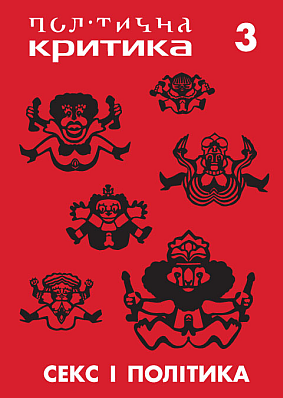
The third issue of Political Critique is dedicated to the politics of
sexuality. It is focused upon such problems as sex industry, monogamy
and its alternatives, commodification of the feminine body, the debate
over pornography, new reproductive technologies, Ukrainian marriage
agencies phenomenon. Apart from the main theme, the magazine will also
touch the forms of alternative politics: the politics of the street and
art politics. At the presentation a film by the editor of Political
Critique Oleksiy Radynski titled Ukrainian Body: Who Is Who will be
screened. The film investigates the social discussion that unfolded
after the closure of Ukrainian Body exhibition at the Visual Culture
Research Center of NaUKMA.
The magazine will be presented by its editorial board and its authors:
Oksana Bryukhovetska, artist, designer of the magazine,
Olha Martynyuk, historian, member of Feminist Ofenzyva group,
Lesya Pagulich, activist, member of Feminist Ofenzyva group,
Nadia Parfan, the editor of the issue, member of Feminist Ofenzyva group,
Nataliya Chermalykh, Zhinochyi Tsekh (Woman’s workshop) project curator, member of Feminist Ofenzyva group.
Moderator Vasyl Cherepanyn, Political Critique editor, Visual Culture Research Center.
http://vcrc.ukma.kiev.ua/uk/pk
http://krytykapolityczna.pl
http://politicalcritique.org
About the Feminist Ofenzyva group and their events: http://ofenzyva.wordpress.com
INTERNATIONAL CONFERENCE “FEMINISM. ASSEMBLAGE POINT”
March 5-9, 2012, 17:00
The conference aims to unite feminist knowledge production, practices and politics of feminism. The conference’s target is to radicalize women’s narrative and to create public space for struggle with different forms of patriarchal power. We hope the conference will trigger the new type of public discussions – open, critical and self-reflective. Everyone who supports the idea of social justice is welcome to the conference.
For visitors’ convenience, there will be a Children’s Corner during the conference. Bring your kids if they are between 2 and 10 years old for participation in trainings, playing with toys, and entertainment.
THE PROGRAMME OF EVENTS
March 5-7th, 2012, 17:00. International Conference «Feminism. Assemblage Point».
Visual Culture Research Center at National University of «Kyiv-Mohyla Academy», 2 Skovorody, Old Academic Building, 1 floor.
March 7th, 2012, 12:30. Press-conference «Ask Feminists a Question».
Visual Culture Research Center at National University of «Kyiv-Mohyla Academy», 2 Skovorody, Old Academic Building, 1 floor.
March 8th, 2012, 14:00. Feminist demonstration «The Church and the State, it’s Time to Live Apart!»
Meeting point: Mykhailivska Square.
19:00. International Women’s Day Party «The Zh Sounds» featuring Crocodiles in Tights, Yana (Zapaska), Zeleni Sestry («Start» club, 28/4 Marshala Rybalky («Lukianivska» metro station, «Start» stadium).
March 9th, 2012, 17:00. Presentation of the magazine «Political Critique» #3: «Sex and Politics».
Visual Culture Research Center at National University of «Kyiv-Mohyla Academy», 2 Skovorody, Old Academic Building, 1 floor.
More information at : http://ofenzyva.wordpress.com, http://www.facebook.com/events/305573549497717
March 1-2, 2012
WOMEN’S WORK UNIT is a collective workshop of female artists who will work to transform the space of Visual Culture Research Center of National University of “Kyiv-Mohyla Academy” (VCRC NaUKMA) through direct work in the gallery, creation of art objects, video installations, body performances, photo projects, working with text etc.
The workshops are open for active common creative work with the visitors every day from 15:00 to 19:00. The presentation of the project and the guiding tour with the artists will take place on March 2nd, at 17:00.
Children room will be available on the territory of the VCRC NaUKMA from 15:00 to 19:00 for all visitors who want to leave their children there for the time of visiting/taking part in the WORK UNIT’s activities.
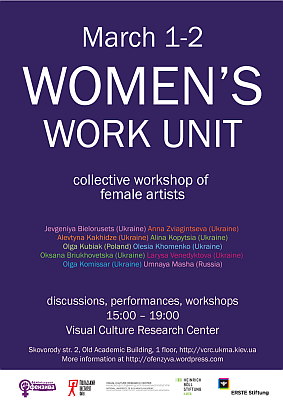
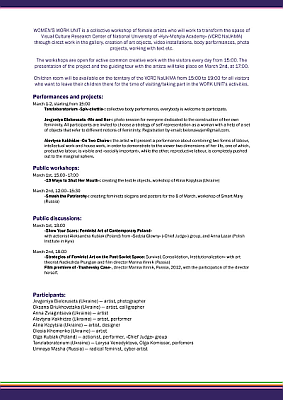
Performances and projects:
March 1-2, starting from 15:00
Tanzlaboratorium “Spiv-chuttia”: collective body performance, everybody is welcome to participate.
Jevgeniya Bielorusets “Me and her”: photo session for everyone dedicated to the construction of her own femininity. All participants are invited to choose a strategy of self-representation as a woman with a help of a set of objects that refer to different notions of femininity. Registration by email: belorusezjen@gmail.com.
Alevtyna Kakhidze “On two chairs”: the artist will present a performance about combining two forms of labour, intellectual work and house work, in order to demonstrate to the viewer two dimensions of her life, one of which, productive labour, is visible and “socially important”, while the other, reproductive labour, is completely pushed out to the marginal sphere.
Public workshops:
March 1st, 15:00–17:00
“10 ways to shut her mouth”: creating the textile objects, workshop of Alina Kopytsia (Ukraine).
March 2nd, 12:00–15:30
“Smash the Patriarchy”: creating feminists slogans and posters for the 8 of March, workshop of Smart Mary (Russia).
Public discussions:
March 1st, at 18:00
“Show your scars: feminist art of contemporary Poland” with actionist
Aleksandra Kubiak (Poland) from “Sedzia Glowny” (“Chief Judge”) group,
and Anna Lazar (Polish Institute in Kyiv).
March 2nd, at 18:00
“Strategies of feminist art on the post-Soviet space: survival,
consolidation, institutionalization” with art theorist Nadiezhda
Plungian and film director Marina Vinnik (Russia).
Film premiere of “Trushevsky Case”, director Marina Vinnik, Russia, 2012, with the participation of the director herself.
Participants:
Jevgeniya Bielorusets (Ukraine) — artist, photographer
Anna Zviagintseva (Ukraine) — artist
Alevtyna Kakhidze (Ukraine) — artist, performer
Alina Kopytsia (Ukraine) — artist, designer
Aleksandra Kubiak (Poland) — actionist, performer, “Chief Judge” group
Olesia Khomenko (Ukraine) — artist
Oksana Btiukhovetska (Ukraine) — artist, calligrapher
Umnaya Masha (Russia) — radical feminist, cyber-artist
Tanzlaboratorium (Ukraine) — Larysa Venedyktova, Olga Komissar, perfomers
Nadia Plungian (Russia) – art theorist
Marina Vinnik (Russia) – film director
More information at http://ofenzyva.wordpress.com
Open letter to the President of Kyiv-Mohyla Academy S. M. Kvit
Dear Serhiy Myronovych!
Today both, Kyiv-Mohyla Academy and the Visual Culture Research Center in particular are in a situation that turns out to be a deadlock, and it needs a solution. The development of events after your ban of the exhibition Ukrainian Body has been astonishing. It is very significant to track how the highlights that you’ve been making constantly changed and how your arguments transformed. When closing the exhibition, you played the part of a ‘notorious-art-critic’, naming it ‘shit’, since according to your convictions it presented ‘pathogenic texts’ and stated ‘porno as a concept’. Nextly, you declared not wanting to judge the exhibition since you were not an expert in art issues, blaming the VCRC in ‘clandestine’ organization of it, where the contents were hidden from NaUKMA and the visitors, while indeed the exhibition became hidden and clandestine exactly after you personally, voluntaristically closed it. Although there was no official resolution for its closure, and besides the head of university had no legal grounds for such actions. Meanwhile, you also publicly claimed that the exhibition was not actually closed, that you had only locked the door, but the journalists were invited to visit it after making an arrangement with the NaUKMA press service – as if there was crime in the exposition, so that not everyone would have the right to see it. You have presented your act as belonging to a responsible leader, who is anxious for the vulnerable souls of the students under age, and protecting the tranquility of the elder who might be ‘shocked’.
Your argumentation then shifted to accusations toward the Visual Culture Research Center of NaUKMA of ‘unscientific’ work in general, as well as the ‘absence of communication’ with the Academy. Speaking more than once of a public discussion on the situation around the Ukrainian Body, nonetheless you decided to conduct it behind closed doors, inviting several members of the cultural public sphere to participate. Instead of starting ‘communication improvement’, as was mutually agreed on the meeting, the next day you launched the tank of bureaucracy, raising the issue of VCRC activities non-publicly and without any warning or informing beforehand (clandestine, really) at the Academic Council of NaUKMA. Feeling in your proper field, in the grey zone of power, where one can use all the mechanisms of a boss’s authority, here you had no more uncomfortable questions by the journalists, nor any problematic discussions with members of the art community. With rare exception all the members of the Academic Council, of course, supported your act of closing the exhibition, describing it as ‘despicable’, ‘morbid’ and representing ‘evil’. Moreover, Visual Culture Research Center has been accused of imaginary sins and the real problems that the Academy is facing today, from ukrainophobia and scarcely to starting a fire in the Culture and Arts Center (sic!), becoming the spot for the outflow of the collective clear conscience imitation. As it is known, the Academic Council decided to cease the activities of the Visual Culture Research Center of NaUKMA, whereas your basic suggestion was my dismissal from the director’s position. Later you addressed the representatives of the cultural public stating your point more precisely, problematizing then the situation in a completely personalized manner: «the VCRC director simply has to be another person», «this could be done any day now», «a do not aim to revise all of the VCRC activity».
One can see that, apparently, the discursive transformation of your position during the conflict has been following harshly the logic of victimization: first, the exhibition was the problem, then it was the organization of it, an institution afterwards, and finally, one person. Firstly, the art was ‘shit’, however, in the end the person was (as you repeatedly claimed in the media, your statement about ‘shit’ did not refer to the exhibition, but to my person). As long as you are taking the position that the whole problem of the current situation lays in me personally as the director of Visual Culture Research Center of NaUKMA, in order to cut this conflicting Gordian knot, hereby I officially and publicly withdraw my candidacy from the director’s post of VCRC NaUKMA. Being concerned about the institution that I have been running since October 2008, I am guided by the interests of VCRC and the Academy, as closing such a research center would deeply and negatively affect the intellectual and artistic life both inside and outside the university. The VCRC collective has made the decision that from now on the director would be Inna Sovsun, Political Science Department lecturer, who had been working at the VCRC almost from the very start, is well-acquainted with its activity, is experienced in organizing many VCRC events, is active in the current issues in education and disposes of respect and confidence in the Academy’s community. Now that the problem is removed, you should open the exhibition Ukrainian Body at last, and restore the Center’s work for carrying out the next events that were planned.
The solution of this controversial situation turns our faces to the real questions determining the current state of things. For the main problem basically appears to be the fatal mistake the NaUKMA president has made at the beginning, when he closed the exhibition Ukrainian Body – which is so uneasy to admit for him and the members of the Academy’s governing body – harming the university’s image more than anyone. One can continually use bureaucratic slang and anxiety concerning NaUKMA as a cover, or find some other scapegoats, accusing them of all one’s errors, only not to answer for them by himself, however the fact that the president of Kyiv-Mohyla Academy turned to censorship is already accomplished and internationally known. How can one talk about getting into the world’s universities’ top-100 or top-500, when the head of the leading Ukraine’s university reacts on contemporary art as if he were a man from the Middle Ages? What kind of atmosphere will there be in Kyiv-Mohyla Academy in ten years if today, after an unconsidered and inadequate, affected act injustice is being fortified by the official seal, and deepened, gaining undisguisedly the shape of banal revenge? The Academy’s strength has always been its uncustomizedness to the governing board, its conditional dissensus, the polemic clash of different points which makes precisely the space for freedom with the breezing spirit of Universitas. Though today, veiled by ‘corporate culture’, we have the university community that is shaped in a collectivist habitus of Dogville, which is deaf and inferior to alternative modes of development, where the absence of an elementary contemporary cultural competence is common sense.
It is sad to admit that the Academy’s goal is now found in protecting the students from social critique, normalizing them and teaching the ‘world moral values’. But the monopoly for establishing meanings in the university would not belong to the administrative bureaucratism eternally. Sometimes there is a need to verbalize something almost everyone understands clearly, but which is not articulated publicly, being the obscene reverse that serves as the one common base holding for now the governing university’s corpus, namely its body. But the king isn’t wearing anything at all! The debate concerning the ban of Ukrainian Body exhibition has been disorderly reoriented into questions, that were unsystematically picked up to reinforce the blame of the accused and take aside from the most important point: the true obscenity is not in the offences or phrases at the exhibition, it is the actions by the NaUKMA President Serhiy Kvit toward the exhibition and the Visual Culture Research Center of NaUKMA. This obscenity is being by all means oppressed, including repression – only to leave it unproblematized, providing the debate on anything but the true reason of the conflict: the boss’s aggression against contemporary socio-critical art and the institution representing it. It causes dishonour and discreditation for Kyiv-Mohyla Academy – the key phenomenon of the Ukrainian context for the last 20 years. This is why today perhaps, one doesn’t need to distinguish the exhibition’s title with quotes when writing it.
OPEN THE UKRAINIAN BODY!
Respectfully,
Vasyl Cherepanyn,
Visual Culture Research Center of NaUKMA, Cultural Studies department professor
On Thursday, February 23rd, the Academic Council of Kyiv-Mohyla Academy passed a resolution to bar the activities of Visual Culture Research Center of NaUKMA after the end of the exhibition «Ukrainian Body».
Therefore, in this connection on Monday, February 27th at 13.00 VCRC announces a protest action against the acts of censorship and repression of the VCRC, which will be held near the 1st building of NaUKMA (2, Skovorody str.). The Center’s members, students and artists will demand from the NaUKMA President to cancel the decision of the Academic Council, re-open the exhibition «Ukrainian Body» and let the VCRC continue its work.
While the attention of the society and the press to the closing of the exhibition «Ukrainian Body», held at the Visual Culture Research Center, has not yet cooled down, the administration of NaUKMA and its president Serhiy Kvit decided to end the activities of the VCRC itself. In this way they ignored the results of the expert meeting with the prominent representatives of the artistic and intellectual audience, which was aimed at discussing the exhibition’s re-opening.
After the act of censorship concerning the exhibition «Ukrainian Body», which drew a wide response in the Ukrainian and foreign media, the President of Kyiv-Mohyla Academy Serhiy Kvit has initiated a number of bureaucratic restrictions against the VCRC as the organizers of the exhibition. On February 23rd the Academic Council’s decision stopped the activities of VCRC.
The governing body of NaUKMA were exasperated by the public attention and the condemnation of censorship at the ‘most democratic’ university. As a result of the administration’s sanctions, the work of Visual Culture Research Center is no longer possible. The unexpected decision of the administration imperils the events that are planned for March – art exhibitions and the conference on feminism with participants from Poland, Russia, USA, Finland, Serbia and France.
Previously, on February 10th, 2012 President of NaUMA Serhiy Kvit closed the exhibition «Ukrainian Body», dedicated to the study of corporality in the Ukrainian society, three days after its opening. Serhiy Kvit explained his actions in the following way: «It is not an exhibition – it’s shit.» The artists’ actions against censorship, letters from international partners and the media attention did not convince the president of the university to re-open the exhibition.
For additional information, please contact:
Inna Sovsun – 067 502 57 27
Ihor Samokhin – 097 985 58 73
Oleksiy Radynski – 067 442 23 89
Letters of support for the exhibition Ukrainian Body to be re-opened
Oleksandr Soloviov, art critic, contemporary art curator
David Elliott, curator of the First International Biennial of Contemporary Art Arsenale 2012
Liudmyla Gordeladze, director of Zhovten’ Cinema
Svitlana Oleshko, director of the theatre studio Arabesky
Oxana Timofeeva, editor of the magazine New Literary Observer; Chto Delat’? group
Vlad Sofronov, philosopher, publicist, art critic (Moscow)
Serhy Yekelchyk, Ph.D., Associate Professor, University of Victoria, Canada
Michel Onfray, french philosopher and writer, founder of the Popular University of Caen
John-Paul Himka, Professor, Department of History and Classics, University of Alberta
Vitaly Chernetsky, Ph.D., Associate Professor, Miami University, United States of America
Aleksander Kwasniewski, the President of Poland
Sara Goodman, Centre for Gender Studies, Lund University, Sweden
Press-demonstration of the banned exhibition Ukrainian Body
Dear colleagues,
On Friday, February 17th, at 15.00 there will be the third press-demonstration of the banned exhibition Ukrainian Body. The presentation will include commenting of the censored artworks by the curators, organizers and participants of the exhibition.
Visual Culture Research Center at NaUKMA
Press-demonstration of the banned exhibition Ukrainian Body
Dear colleagues,
On Wednesday, February 15th, at 13.00 there will be a press-demonstration of the banned exhibition Ukrainian Body. The presentation will include commenting of the censored artworks by the curators, participants and organizers of the exhibition.
Visual Culture Research Center at NaUKMA
Press-demonstration of the banned exhibition Ukrainian Body
Dear colleagues,
On Tuesday, February 14th, at 14.00 there will be a press-demonstration of the banned exhibition Ukrainian Body. The presentation will include a guided tour on the exposition by the curators, participants and organizers of the exhibition, and commenting on the censored artworks as well.
Visual Culture Research Center at NaUKMA
For visitors of the exhibition Ukrainian Body
On Monday, February 13th, at 12.00 everyone who demands the exhibition Ukrainian Body to be re-opened are gathering near Visual Culture Research Center of NaUKMA (2, Skovorody str., Old Academic Building, 1st floor). For our action to be successful we also ask you to phone the NaUKMA press-center: 044 425 15 36/ +38067 784 24 44 and NaUKMA president’s office: 044 417 84 61 demanding for the exhibition to be opened.
Visual Culture Research Center of NaUKMA
Ukrainian Body to be reopened!
On February 10th, 2012, the president of the National University of
Kyiv-Mohyla Academy Serhiy Kvit personally closed the exhibition
Ukrainian Body at the Visual Culture Research Center. Such decision has
brought the head of Academy into one line with such ‘art critics in
civilian attire’ as Nikita Khrushchev or Vasyl Kostytskyi. The
exhibition Ukrainian Body, being a visual study of ukrainian society
through its corporal experiences aims also at investigating the reaction
of nowaday society to the exhibition’s outcome. Thus, the closure of
the exhibition by the president of NaUKMA and all the discussion
following it, is also part of the exhibition project, which concept is
focused on revealing the sensitive zones and raising issues of the
existing systems of judgement concerning the body and its images.
NaUKMA president’s voluntaristic decision to end the exhibition
collected from works by the most prominent young Ukrainian artists is
explained using the vocabulary that reminds of the 1930s: phrases as “it
is no exhibition – it’s shit”, “pathogenic texts” make an echo to the
Avant-garde artists’ accusations of “degenerative” art. As we see, the
threatening tendencies toward the development of moral censorship at the
state level are now implemented by the direction of a university that
declares democratic principles as its core.
Among the artworks of 17 participants of the exhibition the president’s
attention was attracted by precisely the four works which represent the
topic of the nude body (which, needless to say, has been represented in
art for milleniums). Within this kind of logic one can as well tag the
sculptures from the age of Trypillya, or sexual education school classes
as “pornography propaganda”. Closing the exhibition in the state of
moral panic locks in, together with the research on sexuality, the
opportunity of public debate on the rest of the social problems
represented at the exhibition, namely poverty, senility, social
exclusion, authority corruption.
We are not aware of the reasons why NaUKMA president spreads false
information about the removal of some artworks from the exhibition, we
can only assume it is because of understanding the absurdity of the
exhibition’s closure on the grounds of his accusation. The curators
group has all the photo and video materials documenting the opening of
the exhibition Ukrainian Body and also the visitors’ testimony,
including many journalists, to prove that there were no changes made to
the exposition after its presentation.
The situation we are in today shows how administrators and bureaucrats
take over the functions of art critics and culture experts. These
circumstances create the critical importance of places for the debate on
intellectual and artistic practices, such as universities, art
galleries, research centers. We are inviting NaUKMA president Serhiy
Kvit and anyone else willing to discuss the exhibition Ukrainian Body
with the participants, organizers and the figures of the intellectual
and art scenes on the press-demonstration of the exhibition after which
it has to be reopened again.
For information, please contact the NaUKMA press-center: 044 425 15 36 / +38 067 784 24 44, pressa@ukma.kiev.ua, and NaUKMA president office: 044 417 84 61.
Ukrainian Body to be reopened!
Visual Culture Reseach Center of NaUKMA
Statement of the Visual Culture Research Center at the National University of Kyiv-Mohyla Academy
On February 10th, 2012, the President of the National University of Kyiv-Mohyla Academy Serhiy Kvit banned “The Ukrainian Body”, an exhibition that explores the issues of corporality in contemporary Ukrainian society. The entrance to the gallery is now locked. Serhiy Kvit explained his decision in the following way: “It’s not an exhibition, it’s shit”.
We consider such gesture an unacceptable act of censorship against public dialogue on crucial social and political problems. The exhibition, which was supposed close on February 28th, presents works of such Ukrainian artists as Anatoly Belov, Yevgenia Belorusets, Oksana Bryukhovetska, Alexander Volodarsky, Nikita Kadan, Volodymyr Kuznetsov, Liubov Malikova, Lada Nakonechna, Mykola Ridnii, and many others.
We hope that such an inconsiderate act by the University’s
administration was the result of a misunderstanding that can be cleared
up. We demand the exhibition “Ukrainian Body” to be reopened. Our
petition is to collect signatures against censorship at the NaUKMA.
Please, support, and spread this message.
February 7 – 28, 2012, Monday – Friday, 10:00 – 18:00
Opening: February 7, Tuesday, 18:00
Artists: Anatoliy Byelov, Artur Belozerov, Yevheniya Belousets, Oksana Briukhovetska, Oleksandr Volodarskyi, Vova Vorotniov, Nikita Kadan, Volodymyr Kuznetsov, Sasha Kurmaz, Lyubov Malikova, Ivan Melnychuk, Lada Nakonechna, Max Poberezhskyi, Mykola Ridnyi, Volodymyr Sai, Olexiy Salmanov / Dobrynia Ivanov, Yevgen Samborsky
Curators: Oksana Briukhovetska, Serhiy Klymko, Lesya Kulchynska
Our bodies are being under certain social and material circumstances and are determined by them. Corporal practices are determined by factors considered to be acceptable or desirable. The idea of beauty and norm is implemented in attitudes towards other bodies, sending efforts concerning oneself’s body. Through experts and teachers, family and advertisement, morals and medicine, religion and market we receive instructions on how to utilize our body, we use criteria of its “efficiency” and work out possibilities and modes of an interaction with other bodies.
The exhibition Ukrainian Body is an attempt to take a look at the Ukrainian society as an environment of body’s being, and to conceive the experience of living inside the body. Material surrounding that determines coordinates of limitations and possibilities for our bodies, shapes the everyday-life sensory background – all that is being experienced immediately by the body, “on one’s own back” – reminding us about the harshness of reality, whereas if one can possibly step out of his body, then it’s only forever. Political and ideological guidelines, fears and desires, images and ideas are capable of leaving quite visible signs on the body, they can materialize in corporal forms, manifestations or practices. This complex web of factors of corporal experience and ways of its symbolic cartography has been brought into the focus of art analysis. We suggest to interpret the body, particularly the imaginable, ideal, metaphorical, constructed and caught by participants’ eyes, both as a symptom of its environment and an instrument for its cognition.
Exploring the material, cultural, informative, ideological and aesthetic conditions for the existence of “Ukrainian body”, understanding and appropriating corporal metaphors which operate in our social space, the ways of comprehension, representation and evaluation of corporality, the artists are transforming the gallery space into a laboratory of experiment carried out on each of the visitors, testing and displaying their cognitive mechanisms, zones of sensitivity and systems of judgment.
February 9, 2012, Thursday, 17:30
Timed to the World Cancer Day a documentary film series Life before Death (USA, 2012) screening will be held, dedicated to the problem of the access to pain relief by the terminally ill patients. After the screening there will be a discussion on the reality and statistics of cancer morbidity, the goals and tasks of palliative care in Ukraine.
Participants:
Viktoria Tymoshevska, doctor, director of the “Public Health” program of International Renaissance Foundation.
Zoya Maksymova, doctor at the palliative ward of Kyiv City Hospital №2.
Nadiya Kolesnykova, coordinator of the All-Ukrainian Information Campaign “STOP pain”.
February 3, 2012, Friday, 18:00
Karel C. Berkhoff is a leading researcher at the Netherlands Institute for War, Holocaust and Genocide Studies of the Royal Academy of Arts and Sciences and a lecturer at the University of Amsterdam. His book “Harvest of Despair. Life and Death in Ukraine under Nazi Rule” (“Krytyka”, 2011 – Ukrainian edition) is a study of everyday life and survival strategies during the Nazi occupation in 1941-1944’s of population of a “largest colony of Nazi Germany” – Reichskomissariat Ukraine, which embraced a considerable part of Ukrainian territory.
Participants:
Yaroslav Hrytsak is a professor of history at the
Ukrainian Catholic University (Lviv), the director of the Institute for
Historical Research at the Ivan Franko National University of Lviv,
founding editor of the “Ukraina Moderna” journal.
Vladyslav Hrynevych is a historian, senior researcher at the Institute of Political and Ethnic Studies of NASU, professor at NaUKMA.
Vitaliy Nakhmanovych is a historian, executive secretary of the Public Committee to Commemorate the Victims of Babyn Yar.




